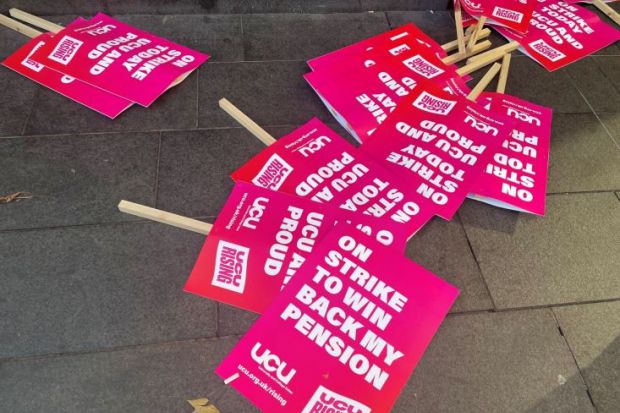Pay negotiations aimed at bringing strikes in UK universities to an end have stalled at the first hurdle due to a lack of agreement over whether industrial action should be suspended while the talks take place.
The first meeting between the Universities and Colleges Employers Association (Ucea) and the five higher education unions on 13 December broke up before negotiations had even begun because of a disagreement over “de-escalating the dispute”.
Ucea said it was “disappointed and dismayed” that the unions’ demands have delayed the start of the pay negotiations, which have been brought forward from March in response to concerns about the cost of living for higher education staff.
In response, the unions said they “could not, and would not, cease all industrial action” and urged employers to come forward with an updated offer before Christmas.
A process for the talks had been agreed on 30 November, Ucea said. This included a statement committing all sides to “de-escalate the dispute” during the “intense period of negotiations” in December and January “including the impact of and employer responses to” action short of strike.
The unions denied agreeing to any such statement but the employer body said they had tried to rescind it at the first meeting and adjourned the talks so it could take this request to its board.
“The need to de-escalate the dispute is a key issue for these talks to take place in good and open faith,” a Ucea statement said. “It is also unfair that students receive no protection from industrial action during this intense period of negotiations.”
The University and College Union (UCU) has announced its intention to call a marking and assessment boycott in January, followed by a possible “indefinite strike” from February, following on from the sector-wide walkouts held in November.
“Universities are on the brink of facing sustained sector wide action, yet they have refused to make us an offer that could settle this dispute,” UCU general secretary Jo Grady said.
“Yesterday, we entered negotiations ready to discuss pay and working conditions but Ucea refused to do so. Instead, it is demanding we bind ourselves to taking no industrial action as a pre-condition of even seeing its offer. No union could agree to such an absurd demand.”
Raj Jethwa, Ucea’s chief executive, said a “vital section” of the process was being “undermined at the outset” and it was “perplexing that unions insist on their need to take industrial action during the period in which employers have actually agreed to meet with them”.
“We hope it does not hamper the real possibility to set aside differences in order to bring forward the…pay negotiations in a bid to address the cost-of-living pressures facing staff,” he added.
The latest developments come after UCU members clashed over whether to call the “indefinite strike” with the union’s higher education committee backing the action but Dr Grady favouring “blocks of escalating action” next year.
Mr Jethwa said he hoped the “infighting” can be resolved “for the good of these pay talks and the sector as a whole”.
He called the threat of indefinite strike action “incomprehensible when trade unions say they want to negotiate a new pay deal”.




